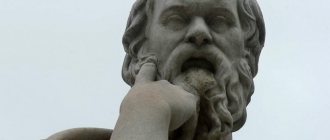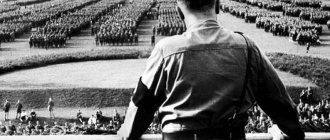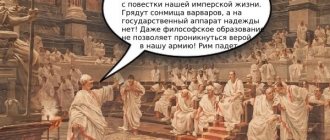No one doubts the power of a word spoken out loud. At all times, in years of serious upheaval and in years of prosperity, oratory had a huge influence on the historical development of countries. The dates and texts of public speeches of great speakers are included in world history textbooks along with the dates of reforms, military defeats, victories and great discoveries.
The word can comfort those who mourn, inspire those who are discouraged, and immortalize grandiose events with the dignity and solemnity that they deserve.
A word can send a person to heroic deeds or to death, make him risk his life in the name of ideals, make him laugh or cry.
One word can change the entire life of a person or an entire nation.
Knowing how to masterfully manage this instrument of influence, a person can have enormous power. Knowing this, tyrants and oppressors of all times have honed their skills as orators for their own purposes. The gift of persuasive speech can be used for both good and evil and should therefore be used with caution.
All that oratory is speech, but not everything that speech is oratory.
A lecture by a teacher, a speech by a political candidate, a presentation of a new product, all these speeches are not necessarily art, but they can nevertheless be elevated to this status. If public speaking can be compared to fast food, then the art of public speaking is haute cuisine.
Not in the sense that it is a gourmet dish, but in the sense that the professionalism required for its preparation requires a much higher level than for an ordinary public presentation. this dish is prepared with passion and creativity, and must be expertly presented and seasoned. And all this in order to get an excellent taste.
The art of public speaking has at all times been recognized as the highest of the arts, encompassing all other disciplines. This requires knowledge of literature, the ability to construct prose, ear and rhythm, harmony and musicality.
It is not just “speaking,” but speech that appeals to our noblest feelings, enlivens our soul, awakens passions and emotions, and inspires us to achieve our goals. Often, the best qualities of public speaking are revealed in times of tragedy and crisis, fear and confusion. In these cases, it serves as a light, a guide for those who cannot understand the chaos themselves and look to the leader to show the way.
“What offends the ears cannot penetrate the soul,” said the famous speaker.
In his works one can find many useful things for modern people: how to develop one’s talent through training and exercises, how a speaker should behave in front of an audience, what techniques can be used to decorate speech.
The era of Cicero and Quintilian was the highest flowering of rhetoric, but at the same time its final limit.
In the Middle Ages, church eloquence became the dominant genre. The Christian Church preached to everyone: both the rich nobleman and the poor peasant. Church preaching has become the most common form of oral mass communication.
The oratory art of the Middle Ages acquires a new quality. Whatever the priest spoke about, he correlated his judgments and conclusions with the Holy Scriptures. History has preserved the names of outstanding theological speakers. John Chrysostom - Byzantine preacher (died 407). The nickname itself indicates a respectful attitude towards public speech. Thomas Aquinas (1225–1274).
History of oratory
This happened in ancient Greece. Speech was raised to the level of art, and the skill of true eloquence was born. The "Golden Age of Eloquence" was ushered in Hellas, and Pericles became the first professional orator. His eulogy was perhaps the first major speech written and prepared for the public, and set the "gold standard" for all future speeches.
The modern world remembers Demosthenes, who is revered as the greatest orator of Greece and perhaps of all time. His abilities as an orator awakened the Athenian people from their deep apathy to fight the threat of Philip of Macedon. However, the practice of teaching oratory was not limited to the elite of Athenian society.
Oratory was considered one of the highest arts, even more - it was considered a virtue. It was an integral part of every person's education, the foundation on which all other academic pursuits and disciplines were built. Mastery of public speaking was considered an integral part of being a well-rounded person. The skill of speech flourished so magnificently and reached such a pinnacle in ancient Greece because of its central function in social life.
The democratic government of Athens encouraged every male citizen to participate in politics. Any citizen could participate in or persuade others of the merits or demerits of a particular piece of legislation. The laws were few and simple, giving judges considerable freedom in the administration of justice. The Assemblies, the Council and the courts were thus the scene of vigorous debate and brilliant oratory.
This type of rhetoric influenced the countries of Central and Western Europe.
The spread was facilitated by the absence of language barriers (sermons were read in Latin).
“Modern times” began with the Western European Renaissance, which put an end to the Middle Ages and by the beginning of the 16th century. marking a new era. It was then replaced by the Age of Enlightenment.
European writers and thinkers B. Pascal, M. Montaigne, Jean de La Bruyère, F. Bacon and others in their works left a lot of subtle advice to the speaker, precise recommendations. As in ancient rhetoric, serious attention is paid to speech technique, manners, and gestures.
For example, Leonardo da Vinci wrote:
“Good speakers, when they want to convince their listeners of something, always accompany their words with their hands, although some fools do not care about such decoration and seem like wooden chairs on their podium.”
If we turn to Russian history, then first of all we should highlight the personality of M.V. Lomonosov (1711 – 1765). It was he who undertook the difficult reform of the Russian language and laid the foundations of modern literary Russian speech. In his work “A Brief Guide to Eloquence” he wrote:
Oratory of Ancient Rome
The art of rhetoric did not originally exist in Rome, but it began to flourish when that empire conquered Greece, which in turn began to influence its traditions. The Roman art of speech flourished in the courts, comitia (meetings where people debated passing laws), and the senate. Roman oratory borrowed much of its style from Greece, although there were differences. The Romans were less intellectual than the Greeks, their speeches were less deep and comprehensive, and were littered with stylistic nuances, stories, and metaphors.
Nevertheless, Roman eloquence was in its own way a very brilliant art and a powerful weapon in the mouths of orators. Cicero, in his speech against Lucius Sergius Catilinus, exposed the conspiracy to overthrow the Roman government, and did so with masterful eloquence and skill.
The great judicial mastery of speech ended with the fall of the Roman Empire - eloquence cannot exist under a despotic form of government. It can only exist in countries where free institutions flourish.
Tacitus, a century after Cicero's death, lamented in The Causes of the Decline of the Art of Eloquence that “... our lawyers are only lawyers, but not orators. Lawyers began to hire clackers to take part in their speeches, and they applauded generously,” which Fr.
Why is there fear of public speaking?
Let's analyze this issue. For most of us, talking with a friend is a normal and enjoyable pastime. And at the same time, a similar conversation on the same topic in front of an audience seems to be something unnatural and causing internal anxiety. Why? The point is that your role is changing.
In everyday life, when participating in a conversation, we rarely experience pressure from others and the environment in which the conversation takes place. We know that at any second, as soon as we find ourselves in a difficult situation, we can refuse to continue the conversation and relieve ourselves of any responsibility for it.
Speaking to an audience
Visual perception and appearance
When speaking in front of an audience, the speaker must prepare not only his speech, but also work diligently on his appearance . It's no secret that a speaker is first greeted by his appearance. It has long been proven that appearance plays an important role in the first impression. Based on statistics, 55% of the persuasive power comes from the appearance of the speaker and the visual perception of listeners, 35% from the tone of voice and only 10% from words.
Listeners are first and foremost spectators. They will look at the speaker very carefully. Especially the female half pays close attention to detail. The outfit, hairstyle and demeanor will not go unnoticed. A person who is insecure, ill-prepared or indecisive quickly becomes noticeable. The audience will not want to concentrate and delve into the essence of his speech . And no matter how hard the speaker tries, it will be very difficult to win over the audience.
Maintaining attention
The art of oratory consists precisely in the ability to deliver a prepared report or a speech constructed on the fly. A true master knows how to quickly navigate and construct logical sentences. In addition, he knows how to attract his listeners and interest him in his performance.
To maintain attention, the speaker uses special techniques that allow him not only to win over, but also to tune in to the same psychological wavelength. In this case, gestures and facial expressions, voice and intonation play an important role. After all, it is one thing to listen, and quite another to be heard. The famous poetess M. Tsvetaeva also spoke about this. Under no circumstances should the public be given the slightest reason to be irritated.
Contact with the audience
The speaker's speech is mostly a monologue. However, the speaker needs to be able to find contact with the audience . He must try to establish a connection, even an imaginary one. Only in this case can he count on a response. A good speaker is able to sense the mood of the audience and adjust his speech at the right moment. It is as if he reads the thoughts of the listeners and does not allow them to be distracted from the information being presented. This is similar to a mental dialogue in which the other party does not say their wishes out loud. In turn, this does not distract the speaker, but does not exclude two-way communication.
| Factors for successful performance | |
| 1 | Visual perception and appearance |
| 2 | Maintaining attention |
| 3 | Contact with the audience |
| 4 | Eye contact |
Thus, the art of public speaking is an imitation of live communication. It is difficult for a beginner to achieve this, but it is quite possible when mastering basic rhetorical techniques. Among them: direct appeal to the audience, filling the speech with emotions, adhering to conversational syntax. Don’t worry in advance, everything comes with experience, you just need to make an effort and patience.
Eye contact
Another important means of establishing two-way communication is eye contact with the speaker. If you read the prepared text and don’t look up from the paper, the public’s interest will quickly disappear. In this case, the speaker independently builds a wall that protects him from the audience. It is not recommended to look at one corner or the ceiling. Only by looking from one listener to another can the speaker count on uniting the audience and achieving the effect of communication, even at the mental level.
You need to be able to read the reaction in the eyes. In this case, the speaker will be able to control the audience. As soon as he notices the first signs of listener fatigue, he can use one of the proven methods to relieve the audience. For example, this could be a recollection of a funny incident, an insertion of an aphorism or a proverb. It is advisable that they be close to the topic of the speech. You can even step aside from the report and tell a funny joke, winning over the audience. Emotional release when tired will best recreate a friendly atmosphere. All this will allow us to continue the performance, the interest in which will only increase.
Aristotle and his meaning
Speaking about rhetoric, it is impossible not to mention Aristotle. Historians agree that if the treatises of the ancient Greek philosopher had appeared earlier, the history of oratory would have been much richer. It was Aristotle who determined the importance of the main components of speech: credibility (egos), logic (logos) and emotions (pathos).
Numerous works of the philosopher are devoted to their study. The most important of them is “Rhetoric,” where Aristotle talks about the importance of balancing all three principles and how to apply them. For example, you can emphasize the importance of the topic of your speech with the help of properly selected clothing, and the reliability of the information with statistics. To evoke emotions in the audience, you need to ask them questions: at the right time and with the right intonation. These tips are still relevant and actively used by public speaking masters.
Some tips for beginning speakers
- Anyone can learn public speaking. At the same time, it is important to tune in to luck and under no circumstances deviate from your goal.
- You should never show your excitement to strangers, much less talk about poor preparation.
- Avoid monotonous speeches, take the right pause and highlight the right words. Don't forget about intonation when raising and lowering your voice.
- Spend more time on training; it is advisable to rehearse a prepared speech at least 3 times.
- Try to interest the audience from the very beginning of your speech by coming up with an intriguing title.
- When speaking publicly, try to connect with your audience.
- During your speech, change your position and use gestures.
The main advice is this: to master the art of the living word, you need to learn to think beautifully.
Renaissance: orator as a profession
During the Renaissance, the art of eloquence experienced a rebirth. One of the first mentions of the orator's profession appeared in the period of pre-revolutionary France. This is what the members of the Tribunal called themselves, who were given the honor of defending their own bills. In educational institutions, this is the speaker of the church pulpit, responsible for religious sermons. And over time, in educational institutions, an orator or speaker began to be called a person who made speeches during important meetings: at conferences, degree awards, or graduations.
“There is nothing more powerful than words. This is an invisible weapon. Without it, the world would belong to brute force." Anatole France
Thanks to the poet Francesco Petrarch, history learned about Cicero’s important and once lost treatise “Brutus”. This text became a reference book for oratory, and continues to be an important and supporting document to this day. But the figures of the Renaissance developed the philosopher’s teachings towards greater artistry. Humanists, including Thomas More, Erasmus of Rotterdam and Francois Rabelais, called rhetoric the most important aspect of human life. It is the word, they argued, that can kill a person, and it can also resurrect him.
V. Kandinsky “Small Worlds I” (1922)
Aristotle's ideas about rhetoric
Aristotle's contribution to the development of science was enormous. It was he who created the first textbook on oratory - “Rhetoric”, which has survived to this day. This work consists of three parts. Aristotle formulated the basic laws of rhetoric:
- Speech provides the state and its goals.
- Every type of oratory represents the unity of ethos, pathos and logos.
- Every type of oratory has its own relationship to reality and time.
It was he who compiled special rules for constructing speech, which are also known as the rhetorical canon. He paid special attention to the external design of speech, opposing the mixing of different styles. Aristotle's ideas about the rhetorical ideal were similar to those of Socrates and Plato. Speech should be maximally focused on encouraging a person to enter into a dialogue, achieving maximum informativeness of the conversation.
Rhetoric in Russia in the 19th and 20th centuries
In the second half of the 19th century, interest in oratory began to gradually fade away. This was due to the fact that intelligent society changed its aesthetic views; its representatives were no longer interested in lofty speeches.
In the post-revolutionary period in Russia, rhetoric was excluded from the public education system. The political regime in the country demanded a standardized language, devoid of individuality. Therefore, the authorities closed all educational institutions and faculties that emphasized the teaching of rhetoric.








